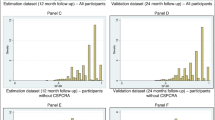Abstract
Purpose
To examine changes in anxiety over time (trajectories) in men with prostate cancer faced with a decision to participate in a clinical trial and to identify demographic and study variables that predict these trajectories.
Methods
Our data come from a larger study examining the efficacy of a decision aid on decisional conflict in men with prostate cancer who were deciding whether to participate in a prostate cancer clinical trial. We used latent growth mixture models to identify ‘classes’ (i.e. groups) of participants with different trajectories of anxiety, as assessed by the State-Trait Anxiety Inventory state scale, and binary logistic regression to determine predictors of anxiety ‘class’.
Results
In 128 men with prostate cancer (mean age = 63), growth mixture modelling identified two classes defined by different anxiety trajectories. One class (n = 27) started with a higher mean anxiety score and did not change over time (stable high), whereas the second class (n = 101) started with lower anxiety and significantly reduced over time (low and recovering). None of the demographic and study variables (including age, education, marital status, and decision to join the trial) was predictive of anxiety class.
Conclusions
Men treated for prostate cancer who have high levels of anxiety after surgery may continue to have persistent high anxiety levels which do not reduce naturally over time. Patient or disease characteristics do not appear to predict anxiety. It is important, therefore, to monitor for anxiety in this population and refer for psychological interventions where required.

Similar content being viewed by others
References
Balderson N, Towell T (2003) The prevalence and predictors of psychological distress in men with prostate cancer who are seeking support. Br J Health Psychol 8:125–134
Steginga SK et al (2004) Prospective study of men’s psychological and decision-related adjustment after treatment for localized prostate cancer. Urology 63(4):751–756
Watts S et al (2013) Depression and anxiety in prostate cancer: a systematic review and meta-analysis of prevalence rates. BMJ Open 4:3
Korfage IJ et al (2006) Anxiety and depression after prostate cancer diagnosis and treatment: 5-year follow-up. Br J Cancer 94(8):1093–1098
Dunn LB et al (2012) Trajectories of anxiety in oncology patients and family caregivers during and after radiation therapy. Eur J Oncol Nurs 16(1):1–9
Lam WWT et al (2010) Trajectories of psychological distress among Chinese women diagnosed with breast cancer. Psychooncology 19:1044–1051
Lam WWT, Ye M, Fielding R (2013) Trajectories of quality of life among Chinese patients diagnosed with nasopharyngeal cancer. PLoS One 7(9):e440022
Parker PA et al (2016) Relationship between illness uncertainty, anxiety, fear of progression and quality of life in men with favourable-risk prostate cancer undergoing active surveillance. BJU Int 117(3):469–477
Dieperink KB et al (2017) Male coping through a long-term cancer trajectory. Secondary outcomes from a RTC examining the effect of a multidisciplinary rehabilitation program (RePCa) among radiated men with prostate cancer. Acta Oncol 56(2):254–261
Dale W et al (2005) The role of anxiety in prostate carcinoma. Cancer 104(3):467–478
Pearse M et al (2014) A phase III trial to investigate the timing of radiotherapy for prostate cancer with high-risk features: background and rationale of the radiotherapy—Adjuvant Versus Early Salvage (RAVES) trial. BJU Int 113:7–12
Sundaresan P et al (2017) A randomised controlled trial evaluating the utility of a patient decision aid to improve clinical trial (RAVES 08.03) related decision-making. Radiother Oncol 125(1):124–129
Spielberger CD et al (1983) Manual for the State-Trait Anxiety Inventory. Consulting Psychologists Press, Palo Alto
Duncan TE, Duncan SC, Strycker LA (2006) An introduction to latent variable growth curve modeling, 2nd edn. Lawrence Erlbaum Associates, Mahwah
Muthén LK, Muthén BO (1998-2011) Mplus User's Guide. Sixth Edition. Los Angeles, CA: Muthén & Muthén
Butow P et al (2015) Clinical pathway for the screening, assessment and management of anxiety and depression in adult cancer patients: Australian guidelines. Psycho-Oncology 24(9):987–1001
Khoja L et al (2016) Does clinical trial participation improve outcomes in patients with ovarian cancer? ESMO Open 1(4):e000057
Chambers SK et al (2014) The validity of the distress thermometer in prostate cancer populations: the distress thermometer in prostate cancer. Psychooncology 23(2):195–203
Funding
This study was supported by Prostate Cancer Foundation of Australia (Young Investigator Grant No. YI 0112) and Royal Australian and New Zealand College of Radiologists Research Grant awarded to PS.
Author information
Authors and Affiliations
Corresponding author
Ethics declarations
Ethical approval was obtained from the Royal Prince Alfred Hospital Human Research Ethics Committee and from site-specific research governance bodies at each participating site (HREC/11/RPAH/433).
Conflict of interest
The authors declare that they have no conflicts of interest.
Rights and permissions
About this article
Cite this article
Costa, D.S.J., Sundaresan, P., Ager, B. et al. Examining trajectories of anxiety in men with prostate cancer faced with complex treatment decisions. Support Care Cancer 27, 567–571 (2019). https://doi.org/10.1007/s00520-018-4351-6
Received:
Accepted:
Published:
Issue Date:
DOI: https://doi.org/10.1007/s00520-018-4351-6




